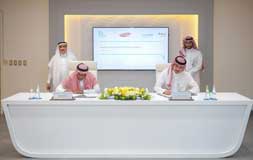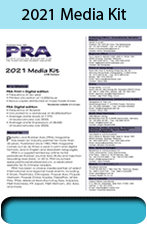Green materials: Sabic subsidiary to set up PET recycling plant in Rabigh; Shell invests in pyrolysis unit in Singapore

Nusaned Investment, a wholly-owned subsidiary of chemical firm Sabic that operates as an autonomous investment company, has signed an investment agreement through Nusaned Fund, managed by Al-Bilad Capital, with Green Kingdom Industries (GKI) and Italian machinery group Amut to set up a PET recycling plant in Rabigh, as part of its commitment to invest in industrial SMEs and contribute to the successful achievement of Vision 2030.
Under the new partnership, the plant will produce recycled PET flakes for food-grade usage to serve the local and global markets.
Faisal Al-Bahair, CEO, Nusaned Investment, said: “We are proud of achieving another milestone in our efforts to align strategically with the objectives of Saudi Arabia as well as Sabic to support local content and enhancing the Kingdom’s competiveness globally. It also support Sabic’s commitment to establish a circular economy and meeting its wider sustainability goals.”
Fahad AlNaeem, Chief Investment Officer, Nusaned Investment, commented: “We are confident that our investment in the PET recycling plant will bring economic value to Saudi Arabia. We are hopeful of more such investments that help the Kingdom’s transformation into an important export hub.”
Eng. Gasem AlShiekh, Chairmon of the Board, Green Kingdom Industries, commented: “The agreement with Nusaned Investment and Amut will help Green Kingdom Industries establish its local presence, open doors to access the global market, and fund its future growth.”

In other news, Shell says it will build a new pyrolysis oil upgrader unit that improves the quality of pyrolysis oil, a liquid made from hard-to-recycle plastic waste that would have gone into a landfill, and turns it into chemical feedstock for its plant. Slated to start production in 2023, the unit at Shell’s Singapore manufacturing site on Pulau Bukom will be the largest in Asia and Shell’s first globally, with a capacity of 50,000 tonnes/year. What it processes is equivalent to the weight of about 7.8 billion plastic bags.
Shell will use the treated pyrolysis oil to produce circular chemicals that are used in hundreds of useful, everyday products, from tyres to mattresses. This responds to growing customer demand and Shell has already signed its first circular chemicals agreement in Asia with Asahi Kasei.
The new investment is a key element in the transformation of the Bukom manufacturing site into the Shell Energy and Chemicals Park Singapore. The Energy and Chemicals Park will be fully integrated with Shell Jurong Island and together will focus on the low-carbon energy and sustainability needs of our customers today and in the future, supplying biofuels, circular chemicals, bitumen, advanced lubricants and renewable energy.
In line with the company’s global targets, Shell Singapore will accelerate its transition and cut its own emissions from its operations by half in 2030 from 2016 levels. As Shell reduces production of traditional fuels in Singapore, including halving its crude processing capacity, it is developing plans to produce sustainable aviation fuel and set up a carbon capture and storage hub, which would capture and safely store emissions for Shell and its customers in the region.
“The Shell Energy and Chemicals Park Singapore is a key driver in our Shell Singapore strategy to transform our business, reduce our own emissions and those of our customers as we move to a low-carbon economy together,” said Chairman of Shell Companies in Singapore, Aw Kah Peng. “We have been progressing with the country for 130 years. The transformation that we are embarking on is unprecedented for the industry here. We will be bold, we will innovate, and we are committed to provide the low-carbon and sustainable products and solutions that our customers want here and around the world.”
Singapore’s Minister for Trade and Industry Gan Kim Yong officiated the ground-breaking ceremony for the new pyrolysis oil upgrader unit, noting the Shell Energy and Chemicals Park Singapore’s relevance to Singapore’s Sustainable Jurong Island plan he unveiled.
“Shell’s strategy is to accelerate our transformation into a provider of net-zero emissions energy products and services. As a key global hub for Shell, Singapore has a very important role to play in this. Together, these investments will help us to cut carbon emissions at our operations and provide the low-carbon and circular solutions that our customers want, in sectors ranging from chemicals to automotive to aviation,” said Shell Downstream Director, Huibert Vigeveno, who was also speaking at the event.
The Shell Energy and Chemicals Park Singapore is exploring a range of projects to deliver low-carbon energy solutions to customers in the region and globally, and meet the target of halving its own emissions by 2030:
- Shell is exploring a regional carbon capture and storage (CCS) hub and will work with a range of customers, including the power sector in Singapore, to reduce the CO2 emissions from their existing operations. Not only will this help Singapore cut its carbon footprint , CCS will also become a cornerstone of the Shell Energy and Chemicals Park Singapore, enabling Shell to design and produce innovative lower carbon fuels, chemicals, and energy solutions like hydrogen.
- Subject to a final investment decision, a 550,000 tpa biofuels facility is planned, where hydrogen made from renewable resources and bio-feedstock, such as used cooking oils and animal fats, can be turned into low-carbon fuels, such as sustainable aviation fuel (SAF), renewable diesel for road transport or renewable chemicals.
Shell’s actions will contribute to Singapore’s delivery of its enhanced nationally determined contribution (NDC) for 2030 and Long-Term Low-Emissions Development Strategy (LEDS) for 2050 under the Paris Agreement and its strategy to achieve a low-carbon transition through the transformation of industry and adoption of advanced low-carbon technologies.
(PRA)
Subscribe to Get the Latest Updates from PRA Please click here
©2021 Plastics and Rubber Asia. All rights reserved.

©2020 Plastics and Rubber Asia. All rights reserved.
Home Terms & Conditions Privacy Policy Webmail Site Map About Us

















